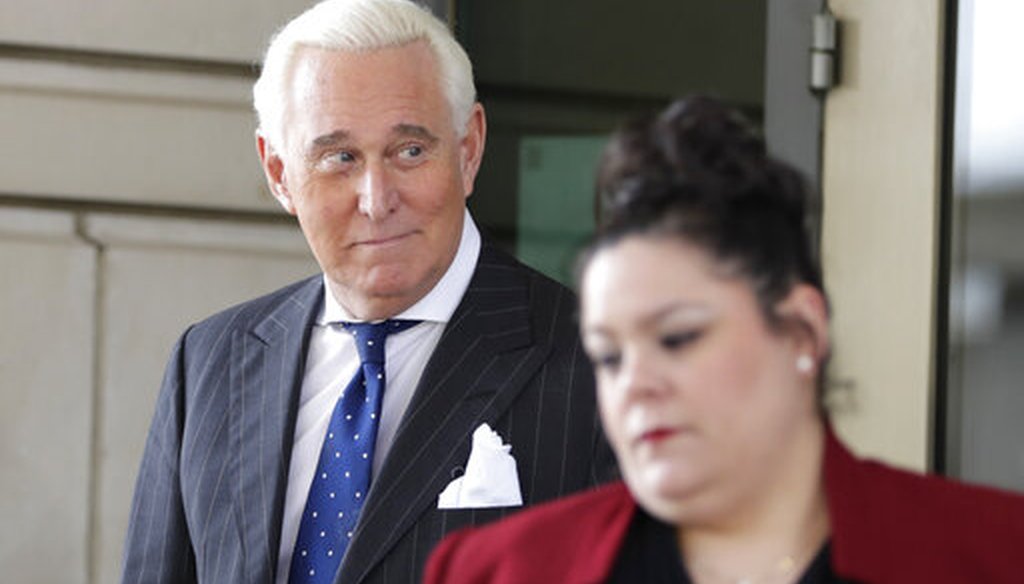Stand up for the facts!
Our only agenda is to publish the truth so you can be an informed participant in democracy.
We need your help.
I would like to contribute

Roger Stone exits federal court in Washington on Nov. 15, 2019. (AP/Cortez)
If Your Time is short
-
President Donald Trump commuted the sentence of longtime friend Roger Stone on July 10, days before Stone was slated to start a 40-month prison term.
-
The White House’s statement explaining the decision made false claims about the legitimacy and scope of the Russia investigation led by Special Counsel Robert Mueller. An inspector general’s report said the FBI’s opening of the investigation was justified.
-
A jury found Stone guilty of witness tampering, lying to Congress and obstructing a congressional investigation. His crimes are no longer “alleged,” and a judge has already rejected the accusations of juror bias repeated in the White House statement.
When President Donald Trump commuted the prison sentence of longtime friend and political adviser Roger Stone, he spared Stone a 40-month prison term for convictions stemming from the Russia investigation led by Special Counsel Robert Mueller.
White House press secretary Kayleigh McEnany announced the move in a Friday evening statement attacking the prosecutors, jury and judge involved in the case. Stone was convicted of witness tampering, lying to Congress and obstructing a congressional investigation.
A federal judge had sentenced Stone to the 40-month prison term in February, following the withdrawal of the four main prosecutors from Stone’s case after the Justice Department intervened to water down their sentencing recommendation.
The White House statement largely echoed Trump’s rhetoric over the years in dismissing the probe into Russia’s election meddling as a "hoax." We found four new statements about Stone’s trial and conviction that needed a fact-check.
The White House did not respond to a request for comment.
"Mr. Stone was charged by the same prosecutors from the Mueller Investigation tasked with finding evidence of collusion with Russia."
Mueller’s investigation was not limited to examining the Trump campaign’s contacts and potential coordination with Russia — an alleged criminal conspiracy that the probe did not establish, according to the report.
Stone’s indictment was the final prosecution brought by Mueller’s team. The case was later taken over by federal prosecutors, including some who had worked on Mueller’s investigation.
Two of the four main prosecutors who withdrew from the case after the Justice Department stepped in to reduce their sentencing recommendation had previously worked on Mueller’s Russia investigation: Aaron Zelinsky and Adam Jed.
The prosecutors had recommended that Stone receive a seven- to nine-year prison sentence, a request that was within federal sentencing guidelines for Stone’s offenses.
Former Deputy Attorney General Rod Rosenstein authorized Mueller as special counsel to investigate any coordination between Russia and the Trump campaign, as well as "any matters that arose or may arise directly from that investigation."
Mueller said the investigation was justified in pursuing Stone.
"Stone became a central figure in our investigation for two key reasons: He communicated in 2016 with individuals known to us to be Russian intelligence officers, and he claimed advance knowledge of WikiLeaks’ release of emails stolen by those Russian intelligence officers," Mueller wrote in an op-ed published after Trump commuted Stone’s sentence.
"The simple fact is that if the Special Counsel had not been pursuing an absolutely baseless investigation, Mr. Stone would not be facing time in prison."
The Mueller investigation was not baseless.
A mountain of evidence produced by the U.S. intelligence agencies — and Mueller — confirmed that the Russians interfered in the 2016 election with the intention of boosting Trump. Their contacts with his campaign did not amount to criminal conspiracy, the Mueller probe found.
Several federal courts upheld the legitimacy of Mueller’s appointment as special counsel in the face of legal challenges, including from Stone.
More recently, a report from Justice Department inspector general Michael Horowitz concluded that the FBI’s decision to open the investigation Mueller later inherited was justified. It had both an "authorized purpose" and an "articulable factual basis," Horowitz wrote in the report.
The FBI opened the investigation, known as "Crossfire Hurricane," in 2016, after it heard from a "friendly foreign government" that Trump campaign adviser George Papadopoulos had signaled that Russia had dirt for the campaign on former Secretary of State Hillary Clinton.
Stone’s conviction was related specifically to false statements he made and actions he took that impeded a congressional investigation into Russian election interference, according to his indictment and the prosecution’s original sentencing recommendation.
Stone was charged with "alleged crimes."
Stone’s conviction remains on the books, even if he never sets foot behind bars. And while the longtime Republican operative is appealing his conviction, his crimes are no longer "alleged."
A jury found Stone guilty in November of obstruction of a congressional investigation, five counts of making false statements to Congress, and tampering with a witness.
"Stone was prosecuted and convicted because he committed federal crimes," Mueller wrote in his op-ed. "He remains a convicted felon, and rightly so."
"There were also serious questions about the jury in the case."
Stone motioned for a new trial over alleged bias and misconduct by the jury foreperson, Tomeka Hart. But U.S. District Court Judge Amy Berman Jackson denied the bid in April.
The White House statement said Stone "deserves a fair trial" and that Hart "concealed the fact that she is a member of the so-called liberal ‘resistance’ to the Trump Presidency," which Stone’s defense argued can be gleaned from negative social media posts about Trump.
Jackson, in an 81-page opinion, dismissed Stone’s allegations of misconduct. "The Court finds that the foreperson did not answer questions falsely on the questionnaire or during voir dire, she did not engage in misconduct during the trial, and the defendant did not use diligence to discover the information present in his motion," Jackson wrote in conclusion.
Jackson said Stone’s legal defense team failed to prove that Hart’s posts demonstrated that she made false statements during the jury selection process. Jackson also wrote that the defense did not object to Hart’s selection to the jury at the time, and that Hart’s opinions about Trump did not "reveal that she had an opinion about Roger Stone, which is the opinion that matters."
"The assumption underlying the motion — that one can infer from the juror’s opinions about the President that she could not fairly consider the evidence against the defendant — is not supported by any facts or data and it is contrary to controlling legal precedent," Jackson wrote.
On Feb. 25, Jackson called the jury back for questioning on whether anything problematic had occurred behind closed doors during the trial. The two jury members questioned said nothing untoward had taken place, the Associated Press reported.
It’s also worth noting that the jury’s decision in Stone’s case — as is required for criminal cases — was unanimous.
"The evidence in this case was substantial and almost entirely uncontested," wrote one juror in a 2019 Washington Post op-ed defending the verdict.
Attorney General William Barr said in a recent ABC interview that Stone’s prosecution was "righteous" and "appropriate" and that the 40-month sentence was "fair" — a contrast to the White House statement’s claim that Stone had an "unfair prosecution, arrest, and trial."
Zelinsky, one of the prosecutors who withdrew from Stone’s case after the Justice Department reduced their sentencing request, testified that he was told Stone actually got "unprecedentedly favorable treatment" in his sentencing because of his relationship with Trump.
Our Sources
The White House, "Statement from the Press Secretary Regarding Executive Grant of Clemency for Roger Stone, Jr.," July 10, 2020
Factcheck.org, "Trump’s Misleading Spin on Roger Stone’s Conviction," July 13, 2020
The Washington Post, "Robert Mueller: Roger Stone remains a convicted felon, and rightly so," July 11, 2020
CNN, "Debunking 12 lies and falsehoods from the White House statement on Roger Stone's commutation," July 10, 2020
ABC News, "Attorney General Bill Barr's interview with ABC News: Transcript," July 9, 2020
ABC News, "Roger Stone's 'sentence was fair': Barr," July 9, 2020
House Judiciary Committee hearing, "Statement from Assistant United States Attorney Aaron S. J. Zelinsky," June 24, 2020
United States District Court for the District of Columbia, "Memorandum Opinion in United States of America v. Roger Stone, Jr.," April 16, 2020
Politico, "Judge rejects Roger Stone’s new trial motion," April 16, 2020
The Associated Press, "Stone judge calls back jurors to address misconduct claims," Feb. 25, 2020
United States District Court for the District of Columbia, "Government Sentencing Memorandum in United States of America v. Roger Stone, Jr.," Jan. 24, 2019
Office of the U.S. Department of Justice Inspector General, "Review of Four FISA Applications and Other Aspects of the FBI's Crossfire Hurricane Investigation," Dec. 9, 2019
The Washington Post, "I was a juror in Roger Stone’s trial. I am proud of how we came to our decision," Nov. 22, 2019
U.S. Department of Justice, "Roger Stone Found Guilty of Obstruction, False Statements, and Witness Tampering," Nov. 15, 2019
CNN, "Fact-check: Trump claims Mueller investigation 'illegal,' ignoring multiple court rulings," March 21, 2019
The Washington Post, "Special counsel Robert Mueller’s appointment is valid, federal appeals court rules," Feb. 26, 2019
United States District Court for the District of Columbia, "Indictment in United States of America v. Roger Stone, Jr.," Jan. 24, 2019
U.S. Department of Justice, "Memorandum from Rod J. Rosenstein to Robert S. Mueller," Aug. 2, 2017
PolitiFact, "Questions and answers about President Trump’s Roger Stone commutation," July 13, 2020
PolitiFact, "Trump attack on former Stone prosecutors ignores critical facts," Feb. 19, 2020
PolitiFact, "Fact-checking Barr’s dispute of inspector general’s report on the FBI, Russia probe," Dec. 11, 2019
PolitiFact, "Mueller spoke. Trump reacted. We fact-checked," May 30, 2019
PolitiFact, "The Mueller report: What you need to know," April 18, 2019
PolitiFact, "Read the redacted Mueller report," April 18, 2019
PolitiFact, "All of the people facing charges from Mueller’s investigation into Russian meddling," March 25, 2019
PolitiFact, "A summary of Special Counsel Robert Mueller’s report is now public. Here’s what it says—and doesn’t," March 24, 2019
PolitiFact, "2017 Lie of the Year: Russian election interference is a 'made-up story,'" Dec. 12, 2017




































